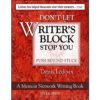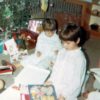A major obstacle you may face when prodded to devote yourself to “improving your writing” as you contemplate writing a memoir is that you, as do most people, know how to write.
By “know how to write,” I don’t mean to convey people know how to compose a long-form literary work but that they know how to write shopping lists, enotes, social media posts and sometimes even letters.
Most people in the Western World know how to write—that is, to string words together in a semi-legible and semi-literate manner. Unfortunately, we use the same word for the process of composing a memoir.
But, writing a memoir calls for more than spelling and grammar. It calls for the ability, generated by discipline, to both manage one’s reactions to writing—what some people call the “inner game”—and to handle the requirements of writing’s best practices—the “outer game.”
Both are necessary to improving your writing.
Best writing practices
In this category I am presenting best writing practices of the outer game of writing.
Of course, there is clearly a factor of “inspiration” of some sort in mot successful pieces of writing, but I am wary of emphasizing inspiration, which too many people believe is the key to a successful piece of writing, as it is different from enthusiasm.
Most of us start to write with some enthusiasm. That is great. However, what will ultimately sustain your writing and make improving your writing possible, is knowledge and skill of best writing practices.
By best practices, I refer to techniques used by writers to steer and enhance reader reaction and to keep the reader reading.
In conclusion
Work on improving your writing. The posts below—as all the posts on this blog—will help you to do just that.
Find here many tips and theories about improving your craft. You will learn much to make your memoir more meaningful and more interesting.
Your memoir and your readers will thank you.

Your Memoir: an Arrest of Disorder
Each poem clarifies something. But then you’ve got to do it again. You can’t get ‘clarified’ to stay so: let you not think that. In a way, it’s like nothing more than blowing smoke rings. Making little poems encourages a man to see that there is shapeliness in the world. A poem is an arrest of disorder.
—Robert Frost, poet
Generating the arrest of disorder of life
When I read the quote above, I did not have to make much of a leap to sense that the words “An arrest of disorder” apply to the task you and I undertake when we write memoir. As the poet so is the memoir writer engaged in art making: the creation of meaning.
More than anything perhaps, we want an arrest of disorder. Disorder seems to be everywhere in life. And so, we take our raw material—the events of our lives and of the lives of the people who surround us—and endeavor to make meaning of it all. In short, we take up our mishmash of events, our disorder of memories, and attempt to make order—or, at the least, to create an arrest of disorder.
This rendering of order proves to be soothing. It is what we deeply wish to achieve in our lives—to have all the disparate and seemingly meaningless (or at least random) occurrences, wishes, pains somehow come together coherently, meaningfully. It all happened, we realize in an “A-ha!” moment, for some reason rather than by chance.
[Free Membership required to read more. See below. ]
We'd love to have you access this content. It's in our members-only area, but you're in luck: becoming a member is easy and it's free.
Already a Member?
Not a Member Yet?

Don’t Use A Writing Prompt Unless…
A writing prompt seems like a good idea—but is it really?
You are given a writing based on a writing prompt—let’s say, “Write about something physical you were afraid of as a child?”—and you instantly start to write about the water slide at Camp Algonquin you were sent to as an eight-year old. You are not sure why you are so moved to write this story but you do not hesitate. You write about standing at the top of the slide and about Martha Cocciardi in back of you on the ladder, shouting “Get going, Patty. I want to slide, too” and, at that moment, you realized there was nothing to be done but to throw yourself at the mercy of fate and hope you survive to enter the fourth grade. You write with some humor and emotional distance suggesting “Oh, silly me! Oh, what little problems we have as children!” [Free Membership required to read more. See below. ]
We'd love to have you access this content. It's in our members-only area, but you're in luck: becoming a member is easy and it's free.
Already a Member?
Not a Member Yet?

Ten Questions On Memoir Writing
Questions On Memoir Writing
The following interview with me appeared in the Nov. 19, 2010, Oral History Education blog, and was later published in 2013. Over the years, these questions on memoir writing still rank as some of the most common questions I receive, and I have to say, the answers haven’t changed either–enjoy!
1. How did you get started in your profession of memoir writing?
I started writing autobiography-based fiction. Some of these have won literary awards, and, while I like that, I feel the most satisfaction from helping readers who are stimulated to tell their own stories after reading my work. This happened in 1988 when my first collection of short fiction, What Became of Them, came out.
After I had read for a group of senior citizens, I was overwhelmed by their eagerness to share their stories with me and each other. That’s how I began helping people to write their memoirs.
[Free Membership required to read more. See below. ]
We'd love to have you access this content. It's in our members-only area, but you're in luck: becoming a member is easy and it's free.
Already a Member?
Not a Member Yet?

Three Causes of “Writer’s Block”
Many writers suffer from writer’s block, yet few understand its possible causes. Memoir writing certainly has its difficulties which can cause writer’s block.

Rework Your Story to Get More Show and Less Tell
There are ways to rework your stories so that you can minimize “telling” and maximize “showing.” The biggest “telling” offense is perhaps…

Avoid Cliches and Stereotypes
If you do not avoid cliches and stereotypes, you will undermine the unique and personal feel of your memoir. Cliches and stereotypes place people in often erroneous and certainly indefensible categories. As short-hand ways of writing and speaking, they reflect ready-made thoughts and adversely affect the ways we relate to our families and friends as unique individuals and how we write about them.
“She was a mother hen—you know how mothers are!”
“My father had a heart of gold.”
[Free Membership required to read more. See below. ]
We'd love to have you access this content. It's in our members-only area, but you're in luck: becoming a member is easy and it's free.
Already a Member?
Not a Member Yet?

Three Tips For Using Fiction Techniques in a Memoir
Why Insert Fiction Techniques in a Memoir?
We all love well-told stories. We love the entertainment, the sound effects, the punchy plot built around solid characterization. As we share stories in our everyday conversations, we inevitably use fiction techniques to keep our listeners’ attention and interest. When we say “And then she said…,” we are using dialogue – that’s using fiction techniques in a memoir.
In our memoir writing, we will often veer toward the same techniques fiction writers use. In fact, we don’t seem to need urging at all to adapt our stories to make them more compelling or to ensure that they drive our point home. We make spontaneous use of fiction techniques in a memoir.
Are Fiction Techniques in a Memoir Valid?
Many life writers ask, “But, am I twisting things when I use fiction techniques in a memoir? Is it really okay?”
[Free Membership required to read more. See below. ]
We'd love to have you access this content. It's in our members-only area, but you're in luck: becoming a member is easy and it's free.
Already a Member?
Not a Member Yet?

Not Being Preachy: Four Tips
The theme is the soul of the story. Every story needs a theme. The negative underside of theme, however, is being preachy. You are preaching when you insist that your reader endorse your theme, message or point of view.
1) Here’s a way to distinguish between being preachy and the right use of theme.
Read your text out loud to yourself. If you have been preachy, your grand, all-inclusive phrases will jump out at you. Sometimes people laugh aloud with awareness as they read aloud such phrases as:
“I’d like to see how many kids today would…” [Free Membership required to read more. See below. ]
We'd love to have you access this content. It's in our members-only area, but you're in luck: becoming a member is easy and it's free.
Already a Member?
Not a Member Yet?

Writing Effective and Interesting Dialog
Dialog allows the reader to hear the voice of the character. It is an opportunity to use regionalisms and particularities of speech. Even to write in pauses if that was typical of the person. “Ain’t much wrong with it,” my grandfather would say…
